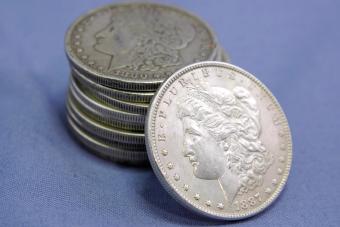
Collecting coins is a wonderful hobby, but it's important to know how to store coins properly to preserve their value. Coins can last for thousands of years, but improper storage can quickly reduce their value. Whether you're storing silver coins that are prone to tarnish or other coins you treasure, these strategies can help you keep them safe.
Choose the Right Coin Storage Environment
Coins are prone to damage for a poor storage environment, including corrosion, tarnish, and other condition issues. You can minimize this damage by controlling the temperature and humidity where you store coins.
Coin Storage Should Be Dry
The ideal coin storage environment should be dry. If you suspect you have too much humidity in your home or you simply want an extra layer of protection, add desiccants to your coin storage area to absorb excess moisture.
Coin Storage Should Be Cool
Knowing how to store coins means knowing how to keep them cool. Avoid damp locations like basements, but find a cool place in your home to keep your collection. Never store coins in hot attics or other places prone to temperature fluctuations.
Coin Storage Material Considerations
The materials you use when storing your coins can protect them, but using the wrong materials can also cause damage. When you choose a storage method, it's important to keep these factors in mind.
Is It Okay to Store Coins in Plastic?
It's not a good idea to store coins in certain types of plastic. You should avoid long term storage with materials that contain polyvinyl chlorides (PVCs), since these chemicals can discolor coins. PVC-containing plastics tend to be flexible and strong, so it's better to choose rigid plastic containers for coins. Avoid storing coins in plastic bags.
Can You Store Coins in Ordinary Cardboard?
Ordinary cardboard presents a problem when it comes to storing coins. The sulfur in cardboard will accelerate tarnishing. This is not how to store silver coins, which The Assay Office reports are especially vulnerable to sulfur-containing cardboard. Instead, look for cardboard that is specially made for storing coins and is low in sulfur.
Never Store Coins Loose
You should never store coins loose in a box or bag. As the coins rub against one another, they create wear. This is damaging to the edges and higher surfaces of coins, and it will reduce the value of your coins. Instead, each coin should be in a dedicated spot in a folder or album or in its own sleeve or box.
Three Different Ways to Store a Coin Collection
The best way to store a coin collection depends on the size of your collection and its value. These are some options to consider.
Coin Folders and Boards - Good for Low-Value Coins
You can store coins in coin folders and boards that have pre-cut circles of the appropriate size. You simply push the coin into the circle and it stays in place. According to Heritage Auctions, these folders and boards work well for low-value coins because they offer affordable organization and some protection. You can purchase the appropriate size for the coin you are collecting, and coin folders retail for under ten dollars at Amazon and other stores. The downside of these folders is that you can only see one side of the coin at once, and the exposed side can become tarnished.
Coin Collection Albums - Good for More Valuable Coins
If you have a large collection of coins and some are valuable, you may want to consider storing them in an album. Coin storage albums allow you to see both sides of the coins because they are protected by slide-down plastic or Mylar windows. These are more expensive than folders, however. Places like the Coin Supply Store sell albums for between $20 and $100, depending on the size. Many albums are designed for a specific type of coin.
Individual Coin Holders - Good for Most Valuable Coins
Rare coins deserve their own holders. If you have some very valuable coins, Heritage Auctions recommends individual holders. There are several types to choose from, including plastic cases, double-sided cardboard with windows, and sealed slabs for certified coins. You can find a variety of options at hobby stores.
Learn About Your Coins to Choose the Best Storage
Part of knowing how to store coins properly involves identifying rare coins that need special individual storage. Learn to identify valuable old pennies, special buffalo nickels, and other treasures. Doing your research will help you choose the right materials and storage environment to preserve the beauty and value of your collection.







